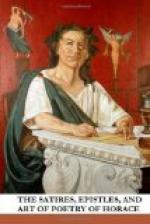I believe I have given the exact force of the original, though the metaphor there is from a gang of slaves, where the best-looking is placed in front to carry off the rest. This interpretation, which the phrase “ducere familiam” seems to place beyond doubt, is as old as Torrentius: but the commentators in general reject or ignore it.
PAGE 157.
For, so he fills his
pockets, nought he heeds
Whether the play’s
a failure or succeeds.
Modern readers may wonder how the poet comes to fill his pockets if the play does not succeed. The answer is that he sold his play to the aediles before its performance. For the benefit of the same persons it may be mentioned, with reference to a passage a few lines lower down, that in a Roman theatre the curtain was kept down during the representation, raised when the play was over.
PAGE 166.
New phrases, in the
world of books unknown,
So use but father them,
he makes his own.
I understand “quae genitor produxerit usus” not, with Orelli, “which shall be adopted into use at once, so that people shall fancy that they have been in use long before,” but, with Ritter, “which shall have been already sanctioned by usage,” the distinction being between words not only in common use but used in literature, and words in use, but not yet adopted into literature, and so relatively “nova.” “Father” of course I use less strictly than Pope uses it in his well-known imitation of the passage, “For use will father what’s begot by sense.”
PAGE 172.
Attempts at ease emasculate my verse.
I find Dean Bagot has a line, “A want of nerve effeminates my speech.”
PAGE 173.
In words again be cautious
and select,
And duly pick out this,
and that reject.
I have adopted Bentley’s transposition, simply because it happened to be convenient in translating.
PAGE 177.
Than alter facts and
characters, and tell
In a strange form the
tale men know so well.
Many years ago I proposed this solution of a passage of admitted difficulty in the Classical Museum. I take “Difficile est proprie communia dicere” in its ordinary sense, “It is hard to treat hackneyed subjects with originality.” Horace then goes on to say that it is better to give up the attempt altogether and simply copy (say) Homer, than to run the risk of outraging popular feeling by a new treatment of (say) the Trojan story, or a new view of the chief characters: but that if a writer still wishes to make the attempt, he may succeed by attending to certain rules, “si nec circa vilem,” &c. &c. Thus I make “publica materies” identical with “communia,” and “privati juris” with “proprie,” contrary to Orelli’s opinion.




